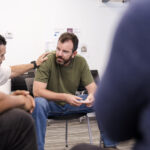
What is Enabling?
According to the American Psychological Association, enabling occurs in close relationships when one person, the enabler, either unwittingly supports or passively permits harmful behavior in the other person. The actions of the enabler make it easier for the person to continue their harmful behavior. They do not have to face the negative consequences of their behaviors or actions. Sometimes the enabler may be aware of the person’s destructive behavior but not know how to prevent it.
Examples of Enabling
Here are seven examples of enabling, as it pertains to substance use disorder:
- Excusing destructive behavior.
- Not setting or sticking to boundaries.
- Allowing an adult child to live at home even though they are a drug user or an alcoholic.
- Giving someone money to buy alcohol or drugs, or buying it for them, so they can avoid withdrawal symptoms.
- Financially supporting an addicted loved one even though they can work.
- Lying for your loved one, such as calling their workplace and saying they are sick when they are high, drunk, or hungover.
- Taking on their responsibilities.
When you enable a person by ignoring their harmful behaviors, you are giving them silent permission to continue those behaviors.
Signs of Enabling
The first step to stopping enabling behavior is to recognize it. The following behaviors are signs you may be enabling a loved one:
- Avoiding the problem
- Denying there is a problem
- Having resentful feelings
- Tolerating or ignoring the person’s problematic or harmful behavior
- Covering up, making excuses, or lying for the person so they do not have to deal with the consequences of their actions
- Neglecting or sacrificing your own needs to care for your loved one
What is Supporting?
Supporting or helping a loved one struggling with addiction means being honest with them even if what you have to say is something they do not want to hear. It means not making excuses for their harmful behaviors. It means helping them gain control over their life. Look for ways where you can offer support, assistance, or empowerment. For example, research treatment centers, offer to drive your loved one to appointments, have conversations about substance addiction, and listen to what they say without anger or judgment. Let them know you care, are concerned, and want to help.
Crossing the Thin Line Between Helping and Enabling
Enabling your loved one does not mean you support their addiction. Some people who enable others are unaware they have crossed the thin line between helping and enabling. They are not intentionally enabling the other person. Or they may worry that not giving their loved one what they want will make the situation worse for everyone.
The key point to remember is that enabling does not help your loved one. Over time, enabling causes further damage to loved ones, family members, and close friends. When a person is in active addiction, they need to face the consequences of their actions; doing so may motivate them to get the help they need.
Putting the Blame on People or Situations
Enablers often make excuses for their loved ones, putting the blame for their addiction on others or on their personality or personal hardships. Several other excuses enablers use include:
- You have no idea of what she has been through in her life. If you did, you would understand why she drinks.
- Everyone at his job drinks or takes pills because work is so stressful.
- He works so hard to put food on the table and provide us with a place to live. When he comes home from work, he deserves to drink.
Addiction is a Family Disease
Addiction is often called a family disease because it affects the person struggling with the addiction and all of their loved ones. If you or a loved one needs help with a drug or alcohol addiction, the professional staff at English Mountain Recovery Center is ready to help. Located in eastern Tennessee Smoky Mountains, we will provide you with the tools you need to reach your goal of sobriety. Your family will be encouraged to take part in our family program that includes family counseling, group therapy, lectures, and more.
 Looking into Tennessee intensive outpatient programs? To learn more about programs offered at English Mountain Recovery, call and speak with someone today at (877) 615-8569. We are ready to help you or your loved one recover.
Looking into Tennessee intensive outpatient programs? To learn more about programs offered at English Mountain Recovery, call and speak with someone today at (877) 615-8569. We are ready to help you or your loved one recover.About the Author: 
Terry Hurley is a retired educational professional and freelance writer with more than fifty years of experience. A former reading specialist and learning center director, Terry loved her years working with children in the educational field. She has written extensively for print and online publications specializing in education and health issues. For the last six years, her writing focus has been on addiction and mental health issues.




